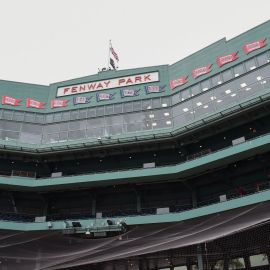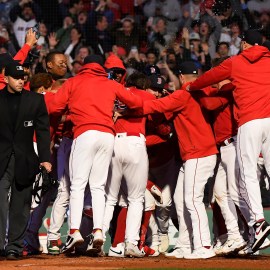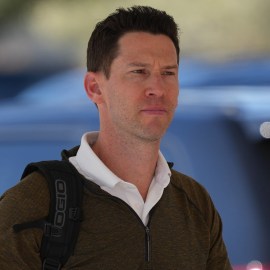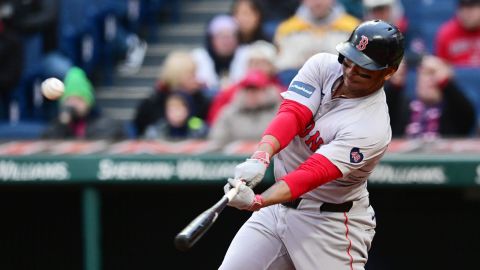Craig Breslow was a key member of the 2013 Red Sox team that won the World Series.
The former reliever also spent the back half of 2012 in Boston, though, thereby giving him a glimpse of the highest of highs and the lowest of lows for an organization and a city that demands success.
The entire experience, in some ways, shaped the player Breslow would be for the remainder of his playing career — a student of the game whose intellect and communication skills were just as important as his on-mound ability.
And it’s now providing him with a unique perspective as Boston’s chief baseball officer, a role in which he’ll be tasked with turning around the Red Sox after back-to-back last-place finishes in the American League East in 2022 and 2023.
Story continues below advertisement
No Matchup Found
Click here to enter a different Sportradar ID.
“I think this is a good team that does a lot of things really, really well. I also think the opportunities to improve are pretty well documented,” Breslow said Thursday during his introductory press conference at Fenway Park, peeling back the curtain on how he views the current iteration of the Red Sox. “And when people think about offseason work — and this will be a theme that I’ll really try to hammer — we generally tend to talk about the acquisition side of things. I think it’s really important not to lose sight of the opportunity to develop our players and continue to push those and identify really clear goals and build really detailed and comprehensive plans around them and ensure that we’re executing them.”
To be clear, the Red Sox’s existing situation isn’t quite as dire as the uphill climb they faced roughly a decade ago. Boston went 69-93 in 2012 — the Bobby Valentine year — while making headlines for all the wrong reasons.
But going from worst to first — the Red Sox went 97-65 in the 2013 regular season en route to the World Series — while carrying the weight of a grieving region in the wake of the Boston Marathon bombings undoubtedly was a lesson in overcoming adversity, for all involved.
Story continues below advertisement
The Red Sox reshaped their roster in 2013, adding veterans like Shane Victorino, Mike Napoli, Jonny Gomes, David Ross, Koji Uehara and Ryan Dempster to a talented core that featured David Ortiz, Dustin Pedroia, Jacoby Ellsbury, Jon Lester, John Lackey and Clay Buchholz, among others.
Now, Breslow and company must do the same, with Rafael Devers, Triston Casas, Masataka Yoshida, Brayan Bello, Garrett Whitlock, Tanner Houck and a host of up-and-coming prospects seemingly representing the foundation on which the new-look baseball operations department can construct. How those efforts take shape — free agency, trades, internal progression, etc. — remains to be seen.
More Red Sox
“I think I would point to the pillars of healthy organization building being acquisition, development and optimization, and the complex interactions among those three things,” Breslow said Thursday. “And so, I think what 2013 told us, above all else, is there’s heavy lifting and incredible work to be done in a front office, in terms of bringing players together and organizing a baseball operation. And then there’s the opportunity to get more out of the group of players that’s in the clubhouse every single day. And that’s the responsibility of the entire organization. It’s the responsibility of the analytics department to try to identify and leverage competitive advantages. Of the coaching staff to keep players moving in the same direction. Of the performance, staff to keep guys on the field. And so, what I’ve learned from 2013 is you can’t look at any one of those things in isolation, but you have to appreciate the complex interactions of all three.”
Sure, we’re more than 10 years removed from Breslow’s dazzling 2013 season, which came one year after he rejoined the team in an under-the-radar trade deadline deal. He’s 43, with experience in the Chicago Cubs front office before being hired last week as Boston’s new CBO.
Story continues below advertisement
The game has changed in that span. A lot. So, not everything is apples to apples. In some areas, we’re talking fruits and vegetables.
But Breslow’s core tenets and takeaways stemming from that unprecedented period in Red Sox history (2012-13) still apply — in some way, shape, or form — as he welcomes this next challenge with open arms.
It’s time to leverage the journey to advance the cause. And while Breslow is green, relative to most other executives across Major League Baseball, he’s also seemingly equipped to handle the pressure of starting from the bottom of the mountain and plotting a meticulous path northward.
Featured image via Jasen Vinlove/USA TODAY Sports Images


















